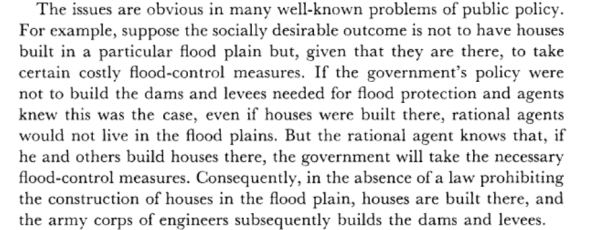How did this ever pass the peer-review procedure… In an article in the Journal of Political Economy Edward Prescott and Finn Kydland argue in favor of (undemocratic) rules instead of (democratic) economic policies. One of the methods they use to push their idea is the using examples. One particular famous one is the one about floodplains. But the example is wrong. Government policies are not as benevolent, rational and effective as Prescott and Kydland think they are. And people are not as rational. Here’s the example: This is not what happens. What happens (and it happened after 1570 and 1717 and 1825 and 1916 and 1953 in the Netherlands and in Germany (around Hamburg) in 1962 and in the USA in New Orleans after 2005) is the next thing: People build houses, farms, factories The
Topics:
Merijn T. Knibbe considers the following as important: Uncategorized
This could be interesting, too:
tom writes The Ukraine war and Europe’s deepening march of folly
Stavros Mavroudeas writes CfP of Marxist Macroeconomic Modelling workgroup – 18th WAPE Forum, Istanbul August 6-8, 2025
Lars Pålsson Syll writes The pretence-of-knowledge syndrome
Dean Baker writes Crypto and Donald Trump’s strategic baseball card reserve
How did this ever pass the peer-review procedure… In an article in the Journal of Political Economy Edward Prescott and Finn Kydland argue in favor of (undemocratic) rules instead of (democratic) economic policies. One of the methods they use to push their idea is the using examples. One particular famous one is the one about floodplains. But the example is wrong. Government policies are not as benevolent, rational and effective as Prescott and Kydland think they are. And people are not as rational. Here’s the example:

This is not what happens. What happens (and it happened after 1570 and 1717 and 1825 and 1916 and 1953 in the Netherlands and in Germany (around Hamburg) in 1962 and in the USA in New Orleans after 2005) is the next thing:
- People build houses, farms, factories
- The government does build dams and levees but these are woefully inadequate
- A storm comes, the floodplain is flooded, scores of people die
- The government and/or the people change the way dams and levees are financed as well as the design of the dams and levees and builds much better dams and levee
So, the outcome is the same. But only after the rational agent which built a house in the floodplain had drowned. As people nowadays also build nuclear reactors in flood plains the problems associated with post hoc policies are even larger than in the past. Time to panic: another flood will come.
